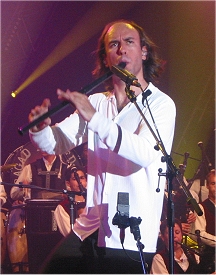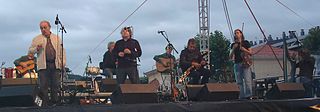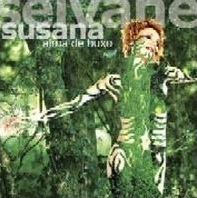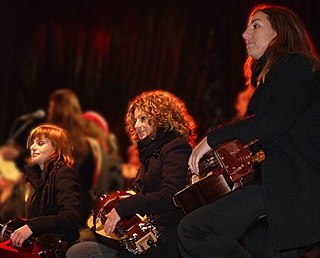| Mares de tempo | ||||
|---|---|---|---|---|
| File:Mares de tempo.jpg | ||||
| Studio album by | ||||
| Released | May 3, 2004 | |||
| Recorded | 2004 | |||
| Genre | Folk | |||
| Length | 53:23 | |||
| Label | Do Fol | |||
| Producer | Rodrigo Romani | |||
| Susana Seivane chronology | ||||
| ||||
Mares de tempo is an album by Galician gaita (bagpipes) player Susana Seivane, released in 2004.
Seivane's third record, in which some well-known Galician musicians participated, is supplemented by a DVD that contains footage of her on stage and off. Mares de tempo is a title that has been taken from the work of the Galician poet Celso Emilio Ferreiro: "Longa noite de pedra". It is a reflection on the passage of time and its effects.
The song, "Muneira de Alen", is one that Seivane had recorded on her previous album, This time it is given a heavier treatment. Almost all the tracks can be described as folk-rock and for the first time there is no acoustic guitar. The tunes and songs mostly come from Gallician Spain.

In Spain, music has a long history. It has played an important role in the development of Western music, and has greatly influenced Latin American music. Spanish music is often associated with traditional styles such as flamenco and classical guitar. While these forms of music are common, there are many different traditional musical and dance styles across the regions. For example, music from the north-west regions is heavily reliant on bagpipes, the jota is widespread in the centre and north of the country, and flamenco originated in the south. Spanish music played a notable part in the early developments of western classical music, from the 15th through the early 17th century. The breadth of musical innovation can be seen in composers like Tomás Luis de Victoria, styles like the zarzuela of Spanish opera, the ballet of Manuel de Falla, and the classical guitar music of Francisco Tárrega. Nowadays commercial pop music dominates.

The Galician gaita is the traditional instrument of Galicia and northern Portugal.
Northwest Iberian folk music is a traditional highly distinctive folk style, located along Spain's north-west Atlantic coast, mostly Galicia and Asturias, that has some similarities with the neighbouring area of Cantabria. The music is characterized by the use of bagpipes.

In Extremo is a German Medieval metal band originating from Berlin. The band's musical style combines metal with Medieval traditional songs, blending the sound of the standard rock/metal instruments with historical instruments. Versions of well-known traditional/Medieval ballads make up the main part of their repertoire, but the band has written an increasing share of original material in recent years. Their own material is written in German, whilst the traditional songs and cover songs are in a variety of languages.

Carlos Núñez Muñoz is a Spanish musician and multi-instrumentalist who plays the gaita, the traditional Galician bagpipe, Galician flute, ocarina, Irish flute, whistle and low whistle.

Susana Seivane is a Galician musician. She was born in Barcelona, Spain, into a family of well-known Galician luthiers and musicians, the Seivane family, whose workshop is the Obradoiro de Gaitas Seivane. She is influenced by skilled bagpipers and is notable in traditional Galician music for synthesizing the style of the ancient bagpipers while creating her own style including other musical influences. Born in Barcelona to a Galician family, she is thereof Galician, from a Coruña to be exact, which is where she has been living for many years now, back in her family home where her family's luthier is located. Many people from Galicia emigrated to other parts of Spain or around the world.

Luar na Lubre is a Celtic music ensemble from Galicia, Spain.

Galicians are a Celto-Romance ethnic group from Spain that is closely related to the Portuguese people and has its historic homeland is Galicia, in the north-west of the Iberian Peninsula. Two Romance languages are widely spoken and official in Galicia: the native Galician and Spanish.

Milladoiro is a music band from Galicia. Often compared to the Chieftains, it is among the world's top Celtic music groups.

Local Ground is the ninth studio album by Irish folk music group Altan, released in March 2005 on the Narada label.

Cristina Pato Lorenzo is a Galician bagpiper, pianist and composer. She is a member of the Silk Road Ensemble led by Yo-Yo Ma and an educational adviser to the Silk Road Project. In 2017 she was collaborating with Harvard University as one of its Blodgett Distinguished Artists in Residence. Cristina Pato is a member of the Artist Committee of Americans for the Arts and a regular collaborator of the Turnaround Arts educational program of the President's Committee on the Arts and the Humanities.

The jota is a genre of music and the associated dance known throughout Spain, most likely originating in Aragon. It varies by region, having a characteristic form in Aragon, Catalonia, Castile, Navarre, Cantabria, Asturias, Galicia, La Rioja, Murcia and Eastern Andalusia. Being a visual representation, the jota is danced and sung accompanied by castanets, and the interpreters tend to wear regional costumes. In Valencia, the jota was once danced during interment ceremonies.

Pljuni i zapjevaj moja Jugoslavijo is the eighth studio album by Yugoslav rock band Bijelo Dugme, released in 1986.

Susana Seivane is the eponymous debut album by Galician gaita (bagpipes) player Susana Seivane, released in 1999.

Alma de Buxo is an album by Galician gaita (bagpipes) player Susana Seivane, released in 2002.

Niña de Fuego is the third studio album by Spanish singer Concha Buika. It was nominated for the Latin Grammy Award for Album of the Year. The record was released on January 2, 2008 via Casa Limón and DRO Atlantic labels.
Os Resentidos was a Galician rock band from Vigo, Spain founded in 1982 by Antón Reixa, Alberto Torrado, Rubén Losada, and Javier Soto. In 1985, Javier later left the band, being replaced by Xabier Debesa. The leader of the band, Antón Reixa, was the vocalist and lyricist while the other band members were instrumentalists. Os Resentidos disbanded in 1994 but got back together again in 2012 on their 30th anniversary.

Uxía is a musician from Galicia, Spain. Her songs are based on traditional music, reinterpreted with a renewed and personal treatment. Among other projects, she is the artistic director and an alumna of the International Lusophone Festival, Cantos na Maré.
The muiñeira is a traditional dance and musical genre of Galicia (Spain). It is distinguished mainly by its expressive and lively tempo, played usually in 6
8, although some variants are performed in other time signatures. There are also variant types of muiñeira which remain in the tempo of 6
8 but which displace the accent in different ways. Muiñeira is associated with traditional choreographic schemes and the associated instrumentation is a form of bagpipe known as a gaita. It is subject to highly varied interpretation in differing local traditions. According to "Galicia-The Spanish Cousins", an article on Roots World, muiñeira is the Galician "equivalent" of a jig, which is consistent with the time signature of 6
8. The word "muiñeira" means literally both millstone and a mill landlady. Galician music is classified as part of Celtic music.

SonDeSeu is the first folk and traditional music orchestra from Galicia, Spain, and it is also considered to be one of the first European contemporary folk orchestras. It is constituted by 53 members and conducted by Rodrigo Romaní.